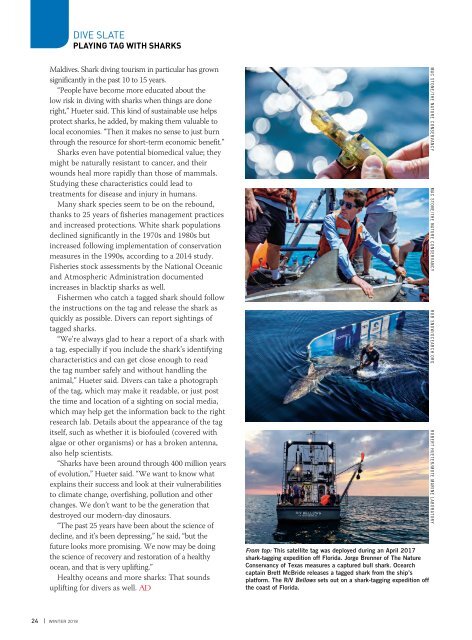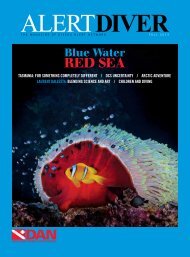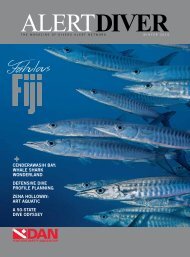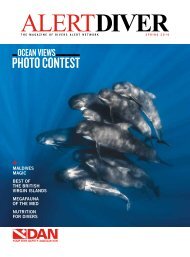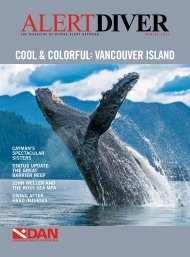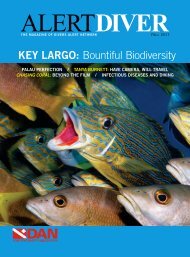AD 2018 Q1
Alert Diver is the dive industry’s leading publication. Featuring DAN’s core content of dive safety, research, education and medical information, each issue is a must-read reference, archived and shared by passionate scuba enthusiasts. In addition, Alert Diver showcases fascinating dive destinations and marine environmental topics through images from the world’s greatest underwater photographers and stories from the most experienced and eloquent dive journalists in the business.
Alert Diver is the dive industry’s leading publication. Featuring DAN’s core content of dive safety, research, education and medical information, each issue is a must-read reference, archived and shared by passionate scuba enthusiasts. In addition, Alert Diver showcases fascinating dive destinations and marine environmental topics through images from the world’s greatest underwater photographers and stories from the most experienced and eloquent dive journalists in the business.
Create successful ePaper yourself
Turn your PDF publications into a flip-book with our unique Google optimized e-Paper software.
DIVE SLATE<br />
PLAYING TAG WITH SHARKS<br />
Maldives. Shark diving tourism in particular has grown<br />
significantly in the past 10 to 15 years.<br />
“People have become more educated about the<br />
low risk in diving with sharks when things are done<br />
right,” Hueter said. This kind of sustainable use helps<br />
protect sharks, he added, by making them valuable to<br />
local economies. “Then it makes no sense to just burn<br />
through the resource for short-term economic benefit.”<br />
Sharks even have potential biomedical value; they<br />
might be naturally resistant to cancer, and their<br />
wounds heal more rapidly than those of mammals.<br />
Studying these characteristics could lead to<br />
treatments for disease and injury in humans.<br />
Many shark species seem to be on the rebound,<br />
thanks to 25 years of fisheries management practices<br />
and increased protections. White shark populations<br />
declined significantly in the 1970s and 1980s but<br />
increased following implementation of conservation<br />
measures in the 1990s, according to a 2014 study.<br />
Fisheries stock assessments by the National Oceanic<br />
and Atmospheric Administration documented<br />
increases in blacktip sharks as well.<br />
Fishermen who catch a tagged shark should follow<br />
the instructions on the tag and release the shark as<br />
quickly as possible. Divers can report sightings of<br />
tagged sharks.<br />
“We’re always glad to hear a report of a shark with<br />
a tag, especially if you include the shark’s identifying<br />
characteristics and can get close enough to read<br />
the tag number safely and without handling the<br />
animal,” Hueter said. Divers can take a photograph<br />
of the tag, which may make it readable, or just post<br />
the time and location of a sighting on social media,<br />
which may help get the information back to the right<br />
research lab. Details about the appearance of the tag<br />
itself, such as whether it is biofouled (covered with<br />
algae or other organisms) or has a broken antenna,<br />
also help scientists.<br />
“Sharks have been around through 400 million years<br />
of evolution,” Hueter said. “We want to know what<br />
explains their success and look at their vulnerabilities<br />
to climate change, overfishing, pollution and other<br />
changes. We don’t want to be the generation that<br />
destroyed our modern-day dinosaurs.<br />
“The past 25 years have been about the science of<br />
decline, and it’s been depressing,” he said, “but the<br />
future looks more promising. We now may be doing<br />
the science of recovery and restoration of a healthy<br />
ocean, and that is very uplifting.”<br />
Healthy oceans and more sharks: That sounds<br />
uplifting for divers as well. <strong>AD</strong><br />
From top: This satellite tag was deployed during an April 2017<br />
shark-tagging expedition off Florida. Jorge Brenner of The Nature<br />
Conservancy of Texas measures a captured bull shark. Ocearch<br />
captain Brett McBride releases a tagged shark from the ship’s<br />
platform. The R/V Bellows sets out on a shark-tagging expedition off<br />
the coast of Florida.<br />
MAC STONE/THE NATURE CONSERVANCY MAC STONE/THE NATURE CONSERVANCY ROB SNOW/OCEARCH.ORG ROBERT HUETER/MOTE MARINE LABORATORY<br />
24 | WINTER <strong>2018</strong>


